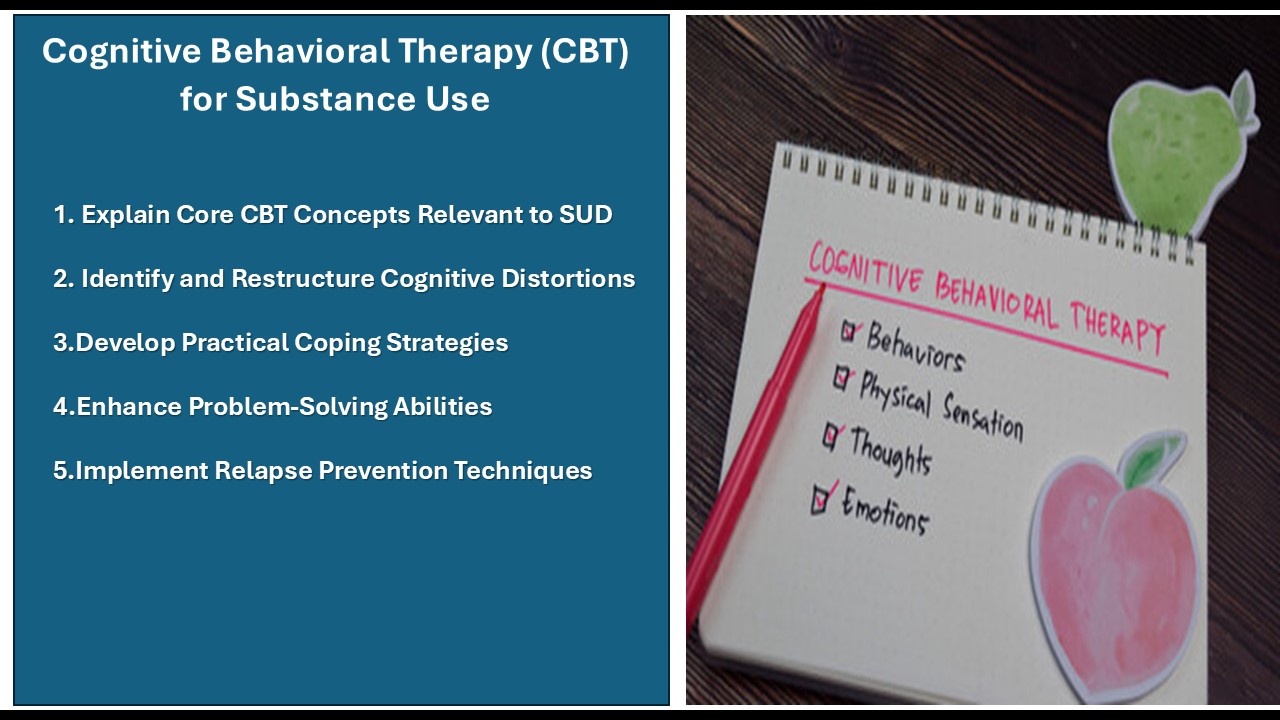A therapeutic approach where individuals with substance use disorders meet regularly in a structured setting to support each other in recovery.
Group Therapy for Treating Substance Use Disorders
Training Description:
Group Therapy for Substance Use Disorders:
In this training, participants review various group counseling formats, from
psychoeducational to process-oriented, and examine the stages of group development. The training
also addresses strategies for managing challenging behaviors and group dynamics. Counselors
will develop confidence in facilitating effective group therapy sessions that enhance peer
support, mutual learning, and accountability among group members.
- Understand Core Group Counseling Models
- Articulate the Stages of Group Development
- Facilitate Effective Group Dynamics
- Manage Challenging Behaviors
- Evaluate Group Progress and Outcomes
Course Learning Objectives
This is a web-based self-paced training which provides 2 hours substance specific
board approved hours. The content for this project has been curated or developed by author Michael Daniels
MSW, LCAS, CCS, LCSW and other many amazing professionals who have donated their expertice and time to
ensure practitioners entering the addiction profession have access to quality trainings without barriers
of finance and access.
Receiving Credit: In order to receive credit for the training you must complete the interactive question within
the training. If you do not complete the embedded quizes, when you get to end of the training you will not
receive credit until you complete the embedded quiz questions. In Addition, you must complete the
50 item quiz at the end of the training and receive at least an85% before receiving your certificate. You do have
the option of retaking the quiz until you reach the approved score. Once you submit your quiz, you will receive
your certificate with in 24 hours.
Groups designed to provide education about substance use, coping strategies, and recovery skills.
A type of group therapy that focuses on exploring emotions, interpersonal relationships, and group dynamics.
Groups that focus on developing practical coping skills, such as stress management, communication, and relapse prevention.
A model describing the phases of group formation: forming, storming, norming, performing, and adjourning.
The sense of trust, support, and connection among group members that enhances therapeutic outcomes.
Methods used by group leaders to promote participation, manage conflicts, and maintain group focus.
Disruptive actions in group therapy, such as dominating, withdrawing, or frequent relapsing, that need to be managed for effective sessions
A communication skill where participants focus on the speaker, provide feedback, and demonstrate understanding.
A therapeutic technique where group members act out scenarios to practice new behaviors and coping strategies.
Groups that specifically focus on identifying triggers, creating coping plans, and maintaining sobriety.
Peer-led or professionally facilitated groups that provide mutual encouragement and accountability in recovery.
Techniques used to address and resolve disputes or disagreements within the group setting.
Methods used to evaluate group effectiveness, such as member feedback, progress tracking, and session reflections.
The ethical principle that ensures discussions within the group remain private to foster trust and openness.

Below you will be able to access the training
- Course Introduction & Overview Key Concepts in Group Therapy for Substance Use Disorders (40 minutes)
- Core Group Counseling Models
- . Stages of Group Development Facilitating Effective Group Dynamics (30 minutes)
- Managing Challenging Behaviors Implementing Evidence-Based Interventions and Activities (30 minutes)
- Evaluating Group Progress and Outcomes
- Course Wrap-Up & Final Assessment (20 minutes)
- Final knowledge check (multiple-choice quiz) Curse evaluation and next steps
Additional Resources Related To This Training
Essential Group Counseling Skills For Treating Substance Use Disorders
Articles Related To This Training
- IS GROUP THERAPY AN EFFECTIVE TREATMENT?
- Group Therapy for Substance Use Disorders: A Survey of Clinician Practices
- Substance Abuse Treatment:Group Therapy TIP 41
- Group Therapy for Substance Use Disorders: A Motivational Cognitive‐behavioural Approach
- Addiction Recovery: 12 Step Programs and Cognative behavioral
Contact: Michael Daniels: Email: danielsm@ecu.edu: Phone: 252 7372117 for any technical questions
Editorial Disclaimer: Although all information contained in each training is based on validated research, any opinions expressed are those of the author's alone, and do not reflect
the opinions of affillate agencies. Although each training has an NCASPPB approved number, they
are not responsible for the content.